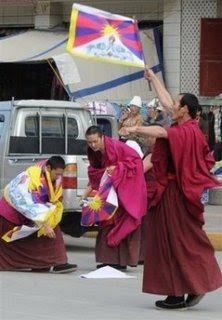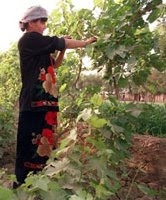Agam's Gecko


Wednesday, May 13, 2009
LABRANG TRUTH-TELLERS ESCAPE TO FREEDOM
| F |
ive Buddhist monks from the Labrang Tashi Kyil Monastery in Tibet's eastern Amdo province (Ch: Gansu) have reached safety in India, after more than a year spent dodging Chinese security forces in their occupied country. The men were on the run from Chinese authorities due to having engaged in free speech activities — a peaceful protest demonstration in Labrang town on March 14, 2008, and an unapproved press briefing at their monastery on April 9, 2008.
Gedhun Gyatso and Kelsang Jinpa, both aged 39, reportedly helped to organise a procession through downtown Labrang (Ch: Xiahe), four days after the 49th anniversary of the Tibetan National Uprising of 1959. In their national capital city Lhasa, many similar processions had been violently suppressed beginning on March 10, with non-violent chanting monks beaten up and detained by Chinese security forces. After five days of this violent response to non-violent demonstrators, a riot broke out in Lhasa late on March 14 in which both Chinese and Tibetans were killed.
Lobsang Gyatso, 24, Jamyang Jinpa, 24, and Jigme Gyatso, 23, participated in an appeal for the world's help during a Chinese stage-managed "international media tour" which visited their monastery on April 9, 2008. Several dozen of Labrang's monks suddenly appeared before the startled journalists and camera crews, bearing their banned Tibetan national flag and banners reading such things as, "We do not have freedom of speech". The unapproved press briefing was extremely embarrassing to the Chinese colonial authorities, who had hoped to prove that all was perfectly well in Tibet by having a compliant foreign press listen to scripted recitations of the PRC talking points. These three men were among the courageous ones who foiled that plan.
Let's have a little reminder of what that looked like. Remember, these men knew they were risking everything when they did this — potentially including their lives. That is the emotion one can hear in the voices. Chinese officials and security are watching it all take place, unable to intervene because the cameras are rolling. From the testimony of Lama Jigme (see previous article) we know that severe retribution was dealt to some of these men after the cameras were gone.
This escape was first reported by Radio Free Asia, which interviewed them on arrival in New Delhi. Those who had participated in these two events learned that they were targets for arrest, and an unknown number took to the mountains around Labrang and tried to avoid capture in small groups.
"We lived like animals, moving from place to place. But this was better than prison," [Gedhun] Gyatso, one of the protest organizers, said in an interview.Gedhun, Kelsang and another companion were surrounded by Chinese police in the mountains after two months of hiding. The two of them escaped but the other companion was captured and remains in prison.
 Buddhist monks prepare banners and national flags as they ready for a procession through Labrang town, March 14, 2008. Photo: Mark Ralston / AFP |
"We called for freedom for Tibet and for the release of Tibetan political prisoners, including the Panchen Lama," [Jamyang] Jinpa said.Jamyang added that a lama had advised them to escape after Chinese troops surrounded the monastery when the journalists were gone. They dressed themselves in laymen's clothing and headed for the hills.
The monks reached Dharamsala on Sunday, to a heroes' welcome as they stepped off the early morning bus from Delhi. A press conference was held on Monday — a real press conference this time, without fear of Communist Party reprisal. Phayul reports:
"We couldn’t remain silent when peaceful Tibetan protests in Lhasa and other places were being brutally crushed down, and our fellow Tibetans were being killed for holding peaceful demonstrations," [Gedhun] Gyatso added.Jamyang Jinpa directly addressed the Chinese government's claim that Tibetans are happy and content under their rule, and that the protests which swept Tibetan regions last year (and continue in smaller scale) were the work of foreign-based "splittist instigators".
"What has been happening in Tibet from last year is a spontaneous outcome of deep rooted resentment Tibetan people have had against the Chinese government. No one was there to tell us to protest. Situation alone compelled us to come out on the street," Jinpa said.The men say their newfound freedom has not given them a sense of relief. They did what they did on behalf of their people, and their people remain under the Communist Party's boot.
"Thinking of Tibet makes us feel worried. Our greatest concern is for those who are still suffering in Tibet. Many Tibetans are undergoing torture in Chinese custody," Gyatso said.The Tibet Post also covered the no fear press conference (although it seems to get both incident dates incorrect), and offers additional statements by the new arrivals. Jamyang Jinpa described the Chinese policy in his country this way:
"Population transfer has made us a minority in our own country, we have been colonized by the Chinese, and Tibetans are forced to acknowledge a fake Panchen Lama. [T]here is no religious freedom in Tibet, we are forced to denounce His Holiness the Dalai Lama who is at the core of our heart, from who we seek refuge and salvation."
 The monks' procession through Labrang town, March 14, 2008. Photo: Mark Ralston / AFP |
The coverage of this great escape has so far been seen on ... the Tibetan exile media only. Up to posting time, this has not been reported on any mainstream international news service, many of whom were present when these monks and others risked everything simply to talk to them last year. This is also very curious, since there are plenty of extra international journalists in India now for the election, and most of those are surely in New Delhi (where these notable escapees first arrived five days ago).
The farming boycott in eastern Tibet is continuing through the last part of the planting season, according to Geshe Monlam Tharchin, a member of the Tibetan parliament in exile. In a report gathered from local sources in the Derge region of Kardze Prefecture, Chinese are reportedly taking land from Tibetans who refuse to cultivate in some areas, and buying up Tibetan farms in other areas for use as a military base, in an increased military presence in the region.
It's now too late in the season for planting wheat, but authorities continue to pressure Tibetans to plant potatoes, peas, and similar crops. Local authorities reportedly issued announcements that, "If you will not to plant the farms, our military will use those farms for our purpose." Many people, mainly men, are escaping their towns and villages on the pretext of gathering medicinal plants. Pressures applied to the population through officially-organized public meetings are meeting resistance, and when asked why they won't plant their farms, the responses are along the lines of, "We Tibetans in the areas are united in our efforts to show our strong solidarity to our brothers and sisters those who lost their lives and those who have faced and are facing brutality, suffering and genocide under the Chinese rule."
In 1983 the government leased wasteland in northern Xinjiang Uyghur "Autonomous" Region to local peasants, on the condition that they grow fruit orchards. By now the orchards are well established and productive, and the government intends to break the 50 year lease, expropriate the land paying a fraction of its value, and sell it to Chinese businessmen.
Township government chief Abdusamet said the orchards would be better managed if they were bought back.So the 25 years of work which created the orchards and made them profitable, is translated as, "unable to manage their orchards well," and the government will "manage it better." (This sounds familiar.) It will do that by tearing up the contracts, buying the land at 20% of its value, and selling it to Chinese businesses. The real reason is almost an afterthought — local government needs the money.
"The farmers are unable to manage their orchards well," he said. "That is why the township government will take it back — we will manage it better."
"We will auction the orchards to Chinese businessmen from the rest of China," Abdusamet said.
"The Uyghur farmers are unable to benefit from these orchards, and our township government needs income," he said.
A court in Dzoge County, Ngaba T-"A"-P (Ch: Sichuan province) sentenced three Tibetans to prison on unknown charges, according to a report received by Voice of Tibet radio. Jampel, 29, and Lama, 23, both of the Chashang Taringtsang family were sentenced to four years, while Namkho, 27, of Chashang Kyajigtsang family got three years. The source said that arbitrary charges, arbitrary sentences and no choice in legal representation are the common standards of justice in Ngaba.
Former President of the Czech Republic, Vaclav Havel has called for basic standards to be upheld in the election for members of the UN Human Rights Council. Terming the election process a "farce" — and he should know farce as well as he knows totalitarianism, as the playwright himself composed a number of farces — he called for adherence to the Council's founding resolution to "uphold the highest standards in the promotion and protection of human rights" during member selection.
Yesterday, China received 167 votes from the 191 member states present in the General Assembly. It wasn't much of a contest, with 20 candidates for 18 open seats. China hailed its own electoral success, citing its "remarkable achievements in the field of human rights." If that's the "highest standard" the UN can come up with, we're all in trouble.
.











 Our way of saying "thanks" in the Thai way. Here a nak muay Thai (kickboxer) offers respect and thanks for his teacher (wai khru) before a match. This is our local variation on the ubiquitous "hat tip" used in general blog culture.
Our way of saying "thanks" in the Thai way. Here a nak muay Thai (kickboxer) offers respect and thanks for his teacher (wai khru) before a match. This is our local variation on the ubiquitous "hat tip" used in general blog culture.






